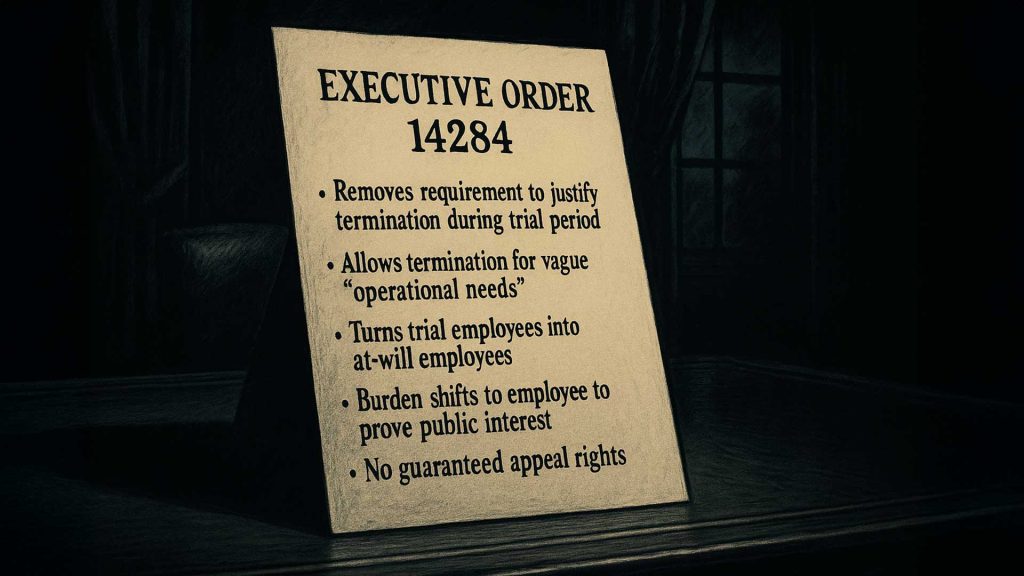Trial Periods for Attorneys at the Board: What Executive Order 14284 Means for You
If you’re an attorney in your first two years at the Board of Veterans’ Appeals (BVA), you need to pay close attention. The recent Executive Order 14284, issued on April 24, 2025, isn’t just a minor policy tweak—it’s a direct attack on the rights of federal employees serving a probationary or trial period. This article breaks down what the Order really means for attorneys in the excepted service at the Board—and why you should be concerned.
That said, there’s some good news. On Friday, June 20th, Board leadership clarified that, due to the growing backlog, they have no intention of removing decision-writing attorneys—including those still in their two-year trial period. So, if you’re not facing any performance or conduct issues, you should be able to breathe a sigh of relief—for now.
Table of Contents

Executive Order 14284: A Raw Deal for Board Attorneys
The Trump Administration claims Executive Order 14284 will “strengthen” trial and probationary periods for excepted service employees, including BVA attorneys. But don’t be fooled—the reality is far more sinister. Instead of protecting employees, this Order shifts the burden squarely onto you to prove you deserve to keep your job, while giving management unchecked authority to terminate you without explanation.
Unlike before, agencies must actively certify within 30 days after your trial period ends that you’ve earned the right to stay. No certification? You’re gone—automatically, with no recourse, except a narrow and complicated appeal process through the Office of Personnel Management (OPM) that may never materialize. This is a dramatic power grab under the guise of “efficiency.”
The Two-Year Trial Period: Statutory But Constantly Misrepresented
The law is clear:
- Non-preference eligible attorneys face a full two-year trial period under 5 U.S.C. § 7511.
- Preference-eligible attorneys (veterans with qualifying service or disabilities) have a one-year period.
Yet, at the Board, misinformation is rampant. Job announcements on USAJobs and even onboarding frequently misstate that attorneys only have a one-year probationary period. Let this sink in: the agency can say whatever it wants, but the government is never legally bound by those inaccurate statements because estoppel does not apply here. You must know the law, or you risk losing your job based on faulty assumptions.
What Has Changed: New Grounds for Termination and the End of Transparency
Gone are the days when your termination during a trial period had to be tied to misconduct or poor performance. Executive Order 14284 removes any obligation for agencies to justify firing probationary employees. Now, management can terminate you for any operational reason—budget cuts, office reshuffling, return-to-office mandates, or vague “operational needs.”
Make no mistake: this effectively makes you an at-will employee during your trial period, stripped of due process and protection. This blatant disregard for employee rights violates Article 33 of the Board’s Master Agreement, a binding contract that management continues to ignore.
Prior Federal Service and Absences: What Counts Toward Your Trial Period
The Order also clarifies that certain prior federal service counts toward your trial period:
- If you have prior service within the same agency (e.g., Department of Veterans Affairs) in the same or similar position, it counts—potentially shortening your trial period. For example, an attorney transferring from VA’s Office of General Counsel to BVA may have no trial period at all.
- Service at other agencies may count if the position and duties are similar. For example, a former Social Security Administration attorney with 18 months of service might only have six months remaining to complete the trial period at BVA.
- Time spent on paid leave (vacation, sick leave, etc.) counts toward the trial period, but unpaid absences over 22 workdays extend the trial period by an equal amount—except absences due to military duty or compensable injury, which count fully.
Burden of Proof: You Must Prove Your Employment is in the Public Interest
Under the new rules, the burden is on you, the employee, to prove your continued employment serves the public interest. Management has broad discretion to weigh “needs and interests of the agency,” “organizational goals,” and “efficiency” against your job security. But don’t expect fairness—this new regime is designed to give management maximum power to cut attorneys without accountability.
Appeals Are a Joke: No Real Protections for Trial Period Terminations
Forget about appealing if you’re terminated during your trial period. There are no standard appeal rights under the Order. Only if OPM someday issues specific regulations might an appeal be possible—and even then, don’t hold your breath. Terminations during trial status are effectively final, and you’re left without meaningful recourse.
Why the Union Opposes Executive Order 14284
The Master Agreement remains in effect and legally supersedes conflicting provisions of the Executive Order. We will fight any attempt by management to violate those protections.
Moreover, the Board’s mission—to provide timely decisions for Veterans—is statutory and critical. Congress, Veterans Service Organizations, and Secretary Collins have all emphasized the urgency of reducing the backlog. Terminating trained attorneys en masse jeopardizes that mission and makes mass firings politically risky.
What You Can Do
- Know your rights and your trial period status. Don’t rely on inaccurate job announcements or management’s word.
- Review the PowerPoint presentation prepared by Local 17 for a detailed breakdown of trial periods, breaks in service, and your rights.
- Contact AFGE Local 17 immediately if you have questions or concerns. We are here to protect you against unlawful or arbitrary termination.
Final Word: Don’t Let the Administration Undermine Your Career
This Executive Order represents a sweeping rollback of protections for new federal employees at the Board. It weaponizes vague “operational needs” and administrative technicalities to give management unprecedented power to fire attorneys at will.
We stand firmly against this assault on your job security and due process. The Board’s mission depends on skilled attorneys, and we will continue to fight to protect those who serve Veterans faithfully every day.
Resources
- Executive Order 14284 (Federal Register) – Official text and summary of the Executive Order affecting federal excepted service trial periods.
- 5 U.S.C. § 7511 (Federal Register) – Statutory definitions and provisions governing federal employee trial periods.
- Board of Veterans’ Appeals Master Agreement (Local 17) – Collective bargaining agreement outlining employee protections, including Article 33.
- Veterans Employment Preference (OPM.gov) – Explanation of preference eligibility affecting trial periods.





